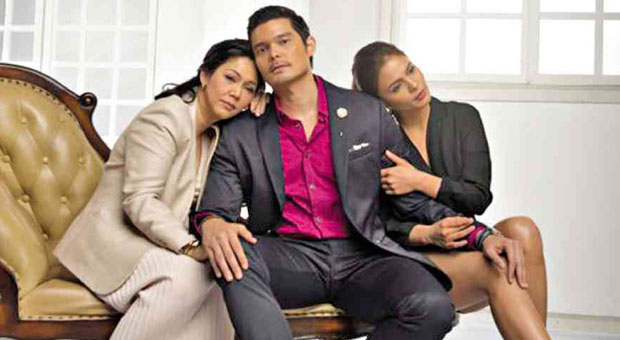Combative characters all end up apologizing
The recent final telecast of GMA 7’s “Ang Dalawang Mrs. Real” was, as expected, a high point in our viewing week, because it finally tried to make insightful thematic sense out of all the big, brash and violent conflict, that had made the series’ tenure on the TV screen so unusually, feistily view-worthy.
Unfortunately, the concluding telecast wasn’t able to efficiently tie all of the show’s loose or “hanging” ends together in an organically insightful way, so it did the less difficult and more convenient thing that many ending teleseryes resort to—make all of its heretofore combative characters retroactively say “Sorry”!
That’s great for World Peace, but it makes for overly facile TV dramatics—so, even if we can’t say that “Mrs. Real” ended with a whimper, its “final-final” telecast did bring most everything down to a “sorry” simper:
Dingdong Dantes’ character finally “grew up” and took mature responsibility for his marital sins and excesses, spent remorseful years in jail, and was finally released after five years to reconcile with Maricel Soriano and their adopted son, who both “accepted” him back with (for Maricel’s feisty character) unseemly haste and sweetness.
In addition, his and Lovi Poe’s love child was just as sweetly included in the extended and expanded family portrait that concluded the series.
Article continues after this advertisementThank goodness, however, Lovi’s character had the good sense not to insert herself into that family portrait—that would have been much too much!
Article continues after this advertisementDingdong’s other key reconciliation “moment” was with his testy father-in-law, played by Robert Arevalo, who all this while had looked down on him, thinking him unworthy of his beloved (spinster) daughter. Quite a number of viewers firmly disagreed with him on that score, but ended up “forgiving” him because, last Sept. 19, he finally “saw the light” and proferred to at long last admire Dingdong for being “man enough” to suffer in jail for his sins, and accepted him back into his uppity family’s fold.
The series’ universally apologetic and forgiving denouement made for pleasant but “blah” TV, particularly when seen in the light of all of the hysterics and “operatics” that had gone before.
For the show’s many resident viragos, combatants and vicious assailants to suddenly behave like they were taking part in a blithe and beatific love-in—that was just too hard to seriously take.
On the plus side, despite its cop-out ending, the series did make key contributions to the ongoing debate about “shared” love and marriage(s), which remains a contentious bone to gnaw at in this country.
Its best contribution was its decision to focus not just on the wayward husband and his two wives, but also on the other people affected and traumatized by the faithless guy’s irresponsible thoughts and actions.
Also pointedly instructive was the show’s revelation that not only Dingdong’s character had a spare family on the side, but so did Lovi’s dad, Tommy Abuel, and other high-and-mighty people who turned out to be the pots that called the kettle black!
